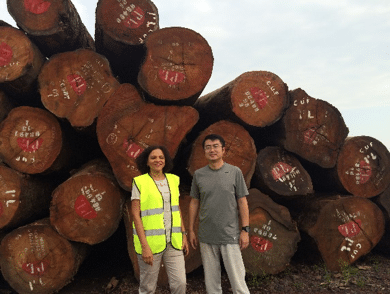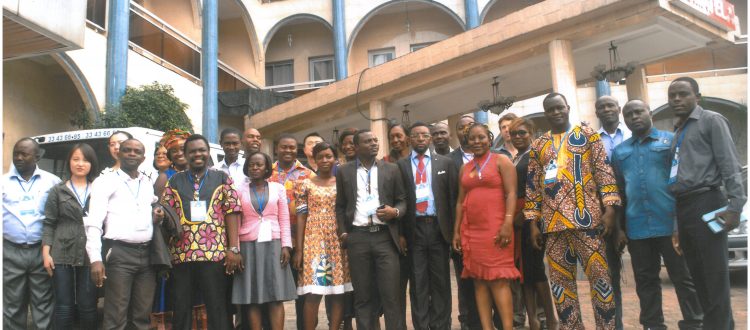Next year, CDB plans to launch an interactive map of all the overseas projects carried out by Chinese NGOs. As part of this project, we are conducting a series of interviews with local NGOs, discussing their overseas projects and the challenges they face. If you work for one and would like your projects to be included in the map, please do not hesitate to contact us at aurora.tin@cdb.org.cn.
While the fires in the Amazon rainforest have caught international attention and made people worried that the Earth’s ‘lungs’ may soon be gone, the vast rainforests in another part of the world – Africa – are also vanishing at a threatening rate, as African economies grow alongside intensive investments from China.
As reported by the Guardian, the greatest forest losses by volume have occurred in tropical Latin America, but the greatest rate of increase in deforestation is taking place in Africa, where rates doubled from less than 2 million hectares a year on average from 2001 to 2013, to more than 4 million from 2014 to 2018. It is estimated that up to 30% of the Congo Basin, a large area of wilderness stretching across six countries containing 20% of the world’s tropical forests, will disappear by 2030.
The International Institute for Environment and Development (IIED), an environmental research institute, points out that agriculture, forestry, mining and infrastructure are the sectors that affect Africa’s forests, while logging is responsible for 33% of forest degradation.
China is often criticized for the loss of forests in Africa because, according to the IIED, 75% of Africa’s timber is exported to China. In Mozambique particularly, out of the 300,000 cubic meters of timber harvested every year, about 90% is exported to China.
Although the big Chinese companies were already working in the remote rainforests of Africa before the Belt and Road Initiative begun, the world’s largest infrastructure and trade project definitely gave these companies a boost. The investment of Chinese companies in Africa is predicted to rise to over USD1 trillion over the next decade. Behind the ribbon-cutting ceremonies, there are winners and losers. Many call for China to take a stronger role in overseeing its investors.

To promote sustainable investment by Chinese enterprises in Africa and an awareness on issues of timber legality and governance, the Global Environmental Institute (永续全球环境研究所, GEI), a Beijing-based Chinese NGO, joined the Research Institute of Forestry Policy and Information (RIFPI) of the Chinese Academy of Forestry (CAF) for the IIED-led China-Africa Forest Governance Learning Project.
Zhang Jingwei, the program officer of the Overseas Investment, Trade and the Environment Division of GEI, says the four-year project started in 2014 under a larger framework led by IIED, aiming to understand the problems and risks faced by Chinese investors in Africa and promote sustainable development that will benefit all the stakeholders through research and policy facilitation.
“Internationally there were voices saying that China might be a buyer of illegal wood products, but there was no evidence to support this claim. GEI therefore conducted a comparative research, analyzing the discrepancies between the timber export data from Cameroon, Uganda, Congo (DRC) and Mozambique and the data on timber that China imported from these countries.”
Zhang adds that theoretically the export and import data should be the same, but the research results show that the records of Chinese imports is larger than the records from the African countries, indicating the possibility of an undocumented timber trade that may be illegal or legal but lacks proper management.
Zhang further explains that there is no clear definition of illegal logging commonly accepted by the exporting and importing countries, creating a grey area of which people can take advantage. African countries may sometimes impose a ban on log exports for a period of time, which means any logs exported are illegal. However such export bans are usually not communicated through to the countries of destination, and therefore the customs of these countries may process the imports in the usual way as long as the documents are complete.
After further digging, GEI revealed that not only is the definition of illegal logging unclear, but the customs operations in many African countries are also poorly managed and executed. For example, Zhang says, “the timber export data in Mozambique is often hand-written and the Forestry Department itself doesn’t keep the full data set. They would need to apply to the National Statistical Office to access the data.”
These disconnected pieces prompted GEI to bring several Chinese customs experts to Africa in 2018, sharing how the timber trade data could be better tracked through the digitalization of the customs process.

Apart from logging, other land-use activities such as the building of infrastructure, which often involves development-induced relocation, also impose risks on Chinese companies, local communities and the environment.
Zhang says: “Chinese companies are known for communicating less with the local NGOs as well as the affected communities. Their common practice is to start the project straightaway after signing a contract with the government, oftentimes without properly handling the problems that the affected communities face.”
GEI tries to provide advice to these enterprises on how they can manage these issues better, and more importantly it pushes for policy change which ultimately could better regulate the code of practice of these companies.
During the project period, GEI successfully held annual learning platform events with IIED and African partners on forest governance, and supported five Chinese journalists to report on Chinese investments in Africa, resulting in published articles about challenges in Africa’s own timber legality and Chinese investment in timber and other related industries. GEI also published two reports on Africa’s timber governance, specifically focusing on export and import regulations in China and African project countries.
As China plays an increasingly significant role in African forestry, Zhang believes that GEI’s work is critical in pushing for bilateral collaboration, which will help improve the mutual understanding between African countries and China, and eventually put an end to illegal logging.

Addressing a global issue in Africa, GEI’s work is challenging. To Zhang, language barriers and the complexity of policy can be overcome, but the real challenge is to build a trusting relationship with the Chinese companies, and to make real changes to their operations.
“Firstly, Chinese companies are not very familiar with the NGO sector in China. The international NGOs that they dealt with might have given them a hard time, so when we approach them, they believe that we are also here to work against their operations. They might not agree to meet us, or even if they do, they have doubts about our identity and might ask if we are a company or if we are from the government. Some also ask where we get our funding.”
Secondly, Zhang points out that even when one or more people from a company are interested in the suggestions provided by GEI, they will need to seek permission from higher up in the company, even the HQ in China, especially when it comes to community projects that require financial support. Their internal coordination mechanisms could bring challenges to the program too.
On the other hand, since China is the biggest player in the African timber trade, GEI as a Chinese NGO has its advantages when it comes to tackling forest degradation in Africa. Working for the benefit of both Chinese investors and the local communities, GEI believes giving constructive solutions instead of condemning is what’s effective.
“On the issue of illegal logging, what the international community usually does is to speak out and raise awareness of this issue. However, to Chinese people or Chinese companies, such actions appear to be a condemnation instead of a solution. So instead of criticizing, we are doing our part by providing constructive solutions, which is also now a trend that many international NGOs are working towards.”
Zhang says that along with the rise of African economies, the world is hoping that African countries will embrace sustainable development and avoid the old development model of “pollute first, clean up later” that China and many other countries had to adopt.
Talking about the balance between development and environmental protection, Zhang claims that GEI’s standing point is rational. She then gives examples to show how sustainable forestry could bring a higher value to the growing African economies without taking a toll on the environment.
“In the illegal logging activities, forest products will be exported in the form of raw logs because that’s what the market demands. When local people are offered a small amount of money, they will cut the trees down. How much added value can the community get from selling raw logs? What we promote is a sustainable model where investors utilize forest resources but also consider contributing back to the forests and local communities. Imagine if they build a wood processing industry that turns their natural resources into products, the livelihood and employment opportunities and the economy will greatly benefit from it.”
The four-year project with IIED ended in 2018, but GEI’s work in Africa continues. The new project will take place in five countries – Cameroon, the Republic of the Congo, Ghana, Liberia and Gabon, focusing on Chinese investment and the impact on the forests in Africa. Through policy changes and improved collaboration between China and African countries, eventually Africa’s rainforest, home to an abundance of animal and plant life, will be well-preserved.



